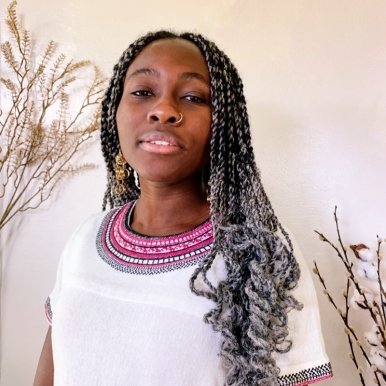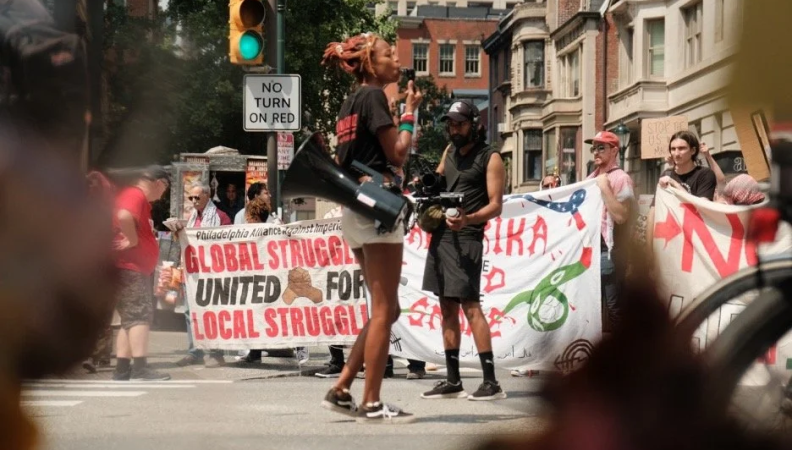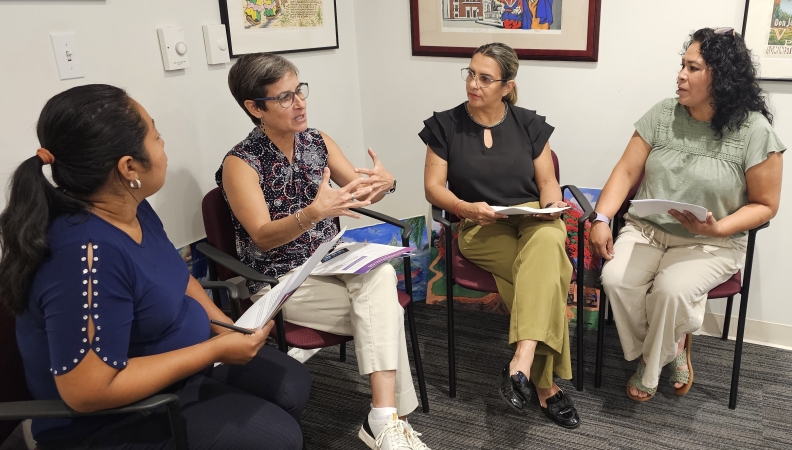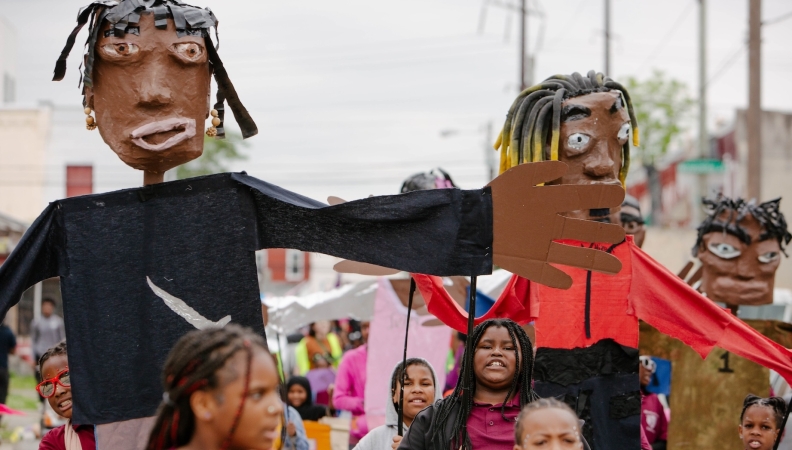How Amistad Law Project is Flipping the Script on Mass Incarceration
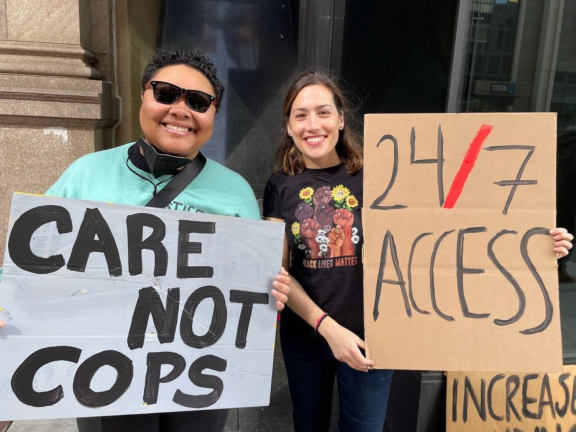
Who controls the narrative about the issue you champion and support?
Whoever shapes the story that wins people’s hearts and influences their worldviews ultimately pushes forward the change they want to see in the world. And Amistad Law Project (ALP) understands and practices this.
ALP is shaping narratives that explore holistic and humane solutions to community safety and security. The nonprofit, which has been organizing to end mass incarceration in Pennsylvania since 2014, is dismantling dominant narratives that frame gun violence and mass incarceration as the result of Black, Brown, and poor white people having a “degenerate culture." Instead, the nonprofit is positioning it as the outcome of deep-seated systemic inequalities.
“We recognized that the vast majority of people’s imaginations have been shaped by racist, pro-carceral narratives, from TV shows that valorize police to crime reporting that frames violence as individual moral failures of young Black men rather than an outgrowth of social inequality and structural racism,” said Amistad Law’s Co-Executive Director Nikki Grant.
“We understood we needed to educate people on what actually reduces violence, which is access to quality housing, fully funded public schools, livable wages, vibrant programs for youth, beautiful community spaces, and other public goods.”
Through shifting narratives around mass incarceration and community safety, Amistad Law invites us to imagine an abundance of solutions that will lead us to a shared outcome: safety and liberation. ALP is also addressing stories and beliefs that shape our society’s viewpoints about how crime and the justice system work, and raising questions about the effectiveness of extreme sentences.
To achieve this, ALP collaborates with local artists and filmmakers to produce short films and its "Move it Forward" podcast to amplify the stories of people impacted by police violence and life without parole. The goal is to broaden policymakers' and communities' perceptions of who a criminal is. It also aims to create more understanding of humane interventions that effectively address harm and promote healing.
The Film that Sparked Global Dialogue
In 2023, ALP screened its short documentary “No Way Home” during the UN Human Rights Committee’s review of the United States. The film follows Lorraine Haw, a Philadelphia mother fighting to reunite her family while advocating to end life without parole in Pennsylvania. After viewing the documentary, the UN began using the term “death by incarceration” instead of “life sentence”—a direct reflection of the film’s narrative impact. In addition, the committee recommended a moratorium on death by incarceration in the U.S. “No Way Home” has also been shown at film festivals, community centers, churches, and other venues, continuing to spark dialogue and raise awareness.
“We are eagerly awaiting a ruling from the Pennsylvania Supreme Court on the constitutionality of mandatory death by incarceration for felony murder, which is the issue we address in “No Way Home.” Based on the oral arguments, the Justices sound sympathetic to the idea that people like Phillip Ocampo, the protagonist in the film, should not be sentenced to die in prison for a crime committed when he was 19, particularly when he didn’t take a life or intend for anyone to die,” said Nikki.
By engaging in narrative shift alongside their legal advocacy work, ALP is taking a strategic and long-lasting approach toward their goal of abolishing death by incarceration (also known as life without parole) in Pennsylvania and creating alternatives to policing.
Through storytelling, Amistad Law is pushing forward the narratives they wish to see in the world related to how mass incarceration damages communities wrestling with the generational trauma of interpersonal violence. Their nuanced and solutions-based approach is yielding much fruit.
The organization led a campaign to build Philadelphia’s first non-police mental health crisis response and secured over $10 million to get that program off the ground. Additionally, they have generated a shift at the Pennsylvania Board of Pardons that drastically increased commutations for people serving life without parole, reuniting over 50 people with their families in the last six years.
The films and podcasts they produce also provide solutions by sharing bold anti-poverty initiatives and resource-building opportunities to foster healing and reduce violence in communities gripped by decades of poverty and divestment.
An Invitation to Reimagine Community Safety and Reclaim Power
In an animated series, “Practical Abolition,” ALP collaborated with artist Erik Ruin to lift up alternatives to policing and prisons. The four-part series explores ideas for programs that could both reduce reliance on police and prisons and reduce street violence. Each episode is less than three minutes long, but within that short amount of time they give a brief history of a current measure being used to respond to crime, such as policing, and share current gaps in the solution along with more humane and just alternative options.
“The Practical Abolition series aims to address a gap we saw between slogans among radicals on social media and the people we’re in community with in our neighborhoods. We wanted to reach people in our communities with messages about tangible things we can actually accomplish that will make life better for all of us,” Nikki shared.
One episode titled “Resources for Communities Not Cops” explores if policing is the only true solution to solving crime. Each video is narrated by a Philadelphia movement leader, and this one is narrated by Amistad’s Co-Executive Director Kris Henderson.
The episode features stop-motion, watercolor animations of a city block that brings to mind memories of Philadelphia corridors such as 52nd Street in West Philly with its small businesses primarily owned by Black and Brown folks, or the 2500 to 2800 blocks of Germantown with its pink, aqua-colored and patterned buildings that are reminiscent of a street in Rio de Janeiro, Brazil.
“There’s a lot of talk about putting more cops in the neighborhoods hardest hit by gun violence. We’ve been doing this for decades. Over the past 40 years, we’ve increased police budgets across the country by over $70 billion, and we haven’t put a dent in street violence in major cities around the country,” Kris narrates. “One problem with that equation is that cops are around to react to situations and deal with the aftermath, not to prevent them in the first place. Imagine instead of sending more police into an area we mobilized resources to the zip codes hardest hit by gun violence.”
The scene of a city block initially features run-down buildings splayed with signs that read: “We Buy Ugly Houses.” We also see broken bottles littering the streets and trash heaps obstructing sidewalk paths. As Kris continues to narrate and invites us viewers to imagine resource-abundant neighborhoods, the “We Buy Ugly Houses” sign is painted over and replaced with a flower shop. Once-abandoned buildings become community centers and small businesses. Green, pink, aqua, and more colors begin to liven up the once black-and-white scene as true life fills the page.
The hopeful and colorful transformation of the once grim scene unfolds as Kris continues narrating about mobilizing resources such as libraries, trauma centers to help people heal and break free from cycles of violence, and job centers to help zip codes hardest-hit by gun violence. And that’s what Amistad Law is inviting all of us to imagine through each narrative shift project: a liberated future where everyone has equal access to dignified well-being, healing, and safety, no matter our class, race, or gender.
“At a time when people are exhausted by our repressive political landscape, people are hungry for stories that give them hope that another world is possible. If you are doing the work of building that world, creative media can both advance your agenda by moving the people you need to reach and also inspire people to positive action in their own communities,” said Nikki.
To create a lasting impact, you must take narrative power. To achieve this, you must engage with media and media-making, one of the important levers for narrative change. Amistad Law Project demonstrates how having a strong narrative strategy is a catalyst for real, transformative progress.
Visit Amistad Law’s media page to discover more about how it's elevating anti-carceral narratives.
Image Credits: Amistad Law Project
